- Home
- Michelle Tea
Mermaid in Chelsea Creek Page 16
Mermaid in Chelsea Creek Read online
Page 16
“H-Hi, Nana,” she said, composing herself.
“Let me guess,” Kishka began. “Your poor, overworked mother is sick, and there is no one to take you to the dump today.”
Sophie’s body rang with alarm. How did Kishka know all this? She remembered Ronald’s dull pronouncement: She knows everything. She imagined her grandmother hovering over a crystal ball, like in The Wizard of Oz, Sophie trapped in the orb like Dorothy.
“Anyone could have guessed such a thing,” said Kishka, annoyed with Sophie’s breathless silence. “All that woman does is work and work and work, with a bunch of slobs who don’t know how to take care of themselves. It’s a wonder she doesn’t get sick all the time.” Kishka exhaled heavily on the other line. Sophie imagined a burst of smoke leaving her mouth, like steam from a train. “I could come get you,” Kishka suggested, freezing Sophie’s heart. “But I’m sure you want to stay at home and help your mother like a good daughter. I bet you have lots and lots of little things to busy yourself with.”
Sophie could feel a patter upon her shield, like raindrops on a windowpane. The patter grew harder, rain becoming hail. The insistent shower of it stung, but Sophie felt snug inside her shield. A new fear bloomed inside her, though—that her grandmother would know that Sophie could hide her emotions. That in itself was confirmation of so many things. Satisfied, Kishka pulled away from her granddaughter. The hailstorm ceased. Sophie breathed a sigh of relief, but kept her shield strong. Her grandmother could not get in, at least not this time. She thought of her mom lying sick in bed. Kishka must have read her when they didn’t show up at the dump on time. Sophie realized that she would have to keep her shield up more often, possibly all the time. The thought made her worried. Didn’t Angel say that it was good for humans to pick up each other’s emotions? Sophie didn’t want to be cut off from the world. The thought made her lonely, and her feelings rose wildly inside their container. A can of feelings, Sophie thought.
“I do want to take care of my mother,” Sophie said. “She needs me to run errands for her, and just hang around. The house is dirty. Dr. Chen might come by.”
“Dr. Chen?” Sophie felt another rain of Kishka’s attentions upon her. “That loon who keeps the pigeons? I’m about to have the city do something about her. Those goddamn winged rats are all over my dump. I’ve got enough problems with the seagulls and the actual rats.”
“I’ll mention it to her,” Sophie said, alarmed. “I’m sure you don’t have to talk to the city. Dr. Chen is really nice; she wouldn’t want to be a problem to anyone.”
“What do you care?” Kishka snapped, then softened. “Oh, my poor granddaughter,” she cooed, sounding almost like an actual, loving grandmother. “Look what it’s done to you. Being a latchkey kid, an only child, no father, your mother barely looking after you. You’ve grown up too fast,” Kishka said. “You’re a little adult, trying to take care of everything. The responsibility you must feel! But you’re just a little girl. You don’t have to take care of it all. Who is taking care of you, Sophie?”
The truth in Kishka’s observations made Sophie’s eyes sting, and she wrapped the shield around her like a blanket. Sophie knew who was taking care of her. She brought them up in her mind: the pigeons, Angel, even Angel’s mother had fixed her a candle and cooked her those beans, would cook her more food if she was hungry, Sophie knew it. Was the mermaid taking care of her? The mermaid caused her to nearly drown, Sophie thought, but she knew the creature would be there for her in her strange, cranky way. Dr. Chen would take care of her, of this Sophie was certain. She felt a tingle in her heart, a loneliness growing. These were her people, weren’t they? Her strange crew. Would they be enough to make up for no father, and an overworked, neglectful mother?
“It’s probably enough to make you feel a little cuckoo,” Kishka continued in her falsely soothing voice. “Neglected children often make up imaginary friends to make themselves feel better. You’re not doing that, are you, Sophie? Hmmmm, but maybe that’s the wrong question. Because you would think the friends were real…”
Sophie had to get off the phone with her grandmother. The woman was trying to crack her shield, make her question her sanity.
“Sophie!” she heard her mother croak from the bedroom. “Would you bring me some water?”
“I have to go,” she said to her grandmother. “Ma has a sore throat and she’s asking for water.”
“Well, maybe I’ll stop by,” Kishka sighed. “I should check on my girls. You are still my girl, aren’t you, Sophie? You would never betray your own grandmother, would you?
“N-No, Nana!” Kishka rattled inside Sophie’s shield. “Of course not.”
“You do know it’s always worse to lie than to tell the truth, don’t you? Because when you lie—well, that makes two infractions. Double the trouble. You don’t want to trouble your grandmother, do you? Your flesh and blood?”
“No, Nana, of course not!” Sophie tried playing it cool. “I don’t know what you’re talking about.”
“Yes, you do,” Kishka said coldly. “You know exactly what I am talking about, Sophia. And you can bury yourself in that rock of yours, but you cannot hide from me. And your friends, all your little friends, they are all even weaker.” Kishka exhaled, and Sophie could almost smell the cigarette smoke through the telephone. “You will not win a fight with me, dear. Whatever lies these people might be filling you with. You are just a girl, a simple, common girl. You are not special. And you will lose every battle you try, so if I were you I would call pest control and tell them you are having some problems with the pigeons in your neighborhood. And stay away from the creek.”
Her grandmother hung up the phone, leaving a crackle in her ear, the sense that even though the connection had been cut, the conversation continued.
* * *
SOPHIE BROUGHT HER mother a glass of water clacking with ice cubes. She shook a bottle of aspirin. “I brought you this,” she said. “But I think you should take this.” She waved another bottle at her, nighttime cold medicine. “It’ll knock you out, so you can sleep off your cold. You really need to sleep, Ma.”
Sophie’s guilt was bunched up inside her shield, known only to her. To her mother she sounded like a concerned and thoughtful daughter, and she was—Sophie did want her mom to be well, to sleep a deep and healing sleep. But Sophie also wanted her mother out. Knocked out. Sophie had a lot to do, and she could do it best, and safest, with her mother zonked out on cold medicine. Am I trying to drug my own mother? Sophie worried. She kept the medicines held out to her mom. “Your choice,” she chirped. Andrea selected the cold medicine, and Sophie felt a rush of relief and excitement.
“Did you make those calls?” Andrea asked. Her hair was triple bedheaded, first from the couch, then from her restless slumber, and then from the sweat of her fever dampening the tangles. Her face was flushed and her eyes looked dull. Sophie kissed her warm cheek.
“Dr. Chen might come by, to see if you need antibiotics,” she said, and Andrea rolled her eyes.
“Right. Get me better quick so I can go right back to work,” she said cynically. It occurred to Sophie that maybe her mother wanted to be sick. Maybe this was the only break Andrea could manage to take.
“No, she’s just concerned for you, Ma. She wants you to feel better. Nana might stop by, too.”
“Gosh, I’m so popular,” she quipped. “I’d better put some pants on. Will you bring me some shorts from my dresser?”
Sophie rifled through her mother’s drawers, a sweet lemony smell filling her nose. Her mother kept little bundles of herbs stashed among her clothes, the perfume of it rose into the air. Sophie found a pair of pajama shorts patterned with ducks and brought them to her mother.
“Go to the store and get orange juice, and those instant soup packets. And some honey and lemon.”
“Right now?” Sophie asked.
“Whenever,” Andrea said. “Go later. Take my purse with you. Just let me sleep. But remember, you’re still pu
nished. No running off with Ella or passing yourself out or anything. I’ll know if you do,” Andrea threatened, full of maternal bravado. Sophie knew she could do all that and more and her mother would never be the wiser. It gave Sophie a sad feeling, that her mother should be so easy to trick.
“Okay, Mom,” she said. “I’ll be right here.”
* * *
THE FIRST THING Sophie did was take plastic bowls from under the sink and fill them with tap water. She carried the sloshing containers out into her yard and lined them up against the back fence. Livia swooped down from a telephone line with a whistle.
“How lovely of you,” she thanked Sophie, and entered the bowl with a splash. Sophie cupped some water into her palms and poured a stream over the pigeon’s grimy head. Livia shut her eyes as Sophie massaged the dirt from her wet feathers. “Oh, my,” she cooed. “That feels wonderful.” Soon the yard around her was fluttering with pigeons wanting a hand washing.
“Me next, me next,” Arthur insisted.
“Would you do that to me, Sophie?” Giddy asked in her tender voice. Beside her, Roy bobbed his neck from side to side.
“I think I really threw something out doing loop-de-loops,” he complained. “Would you mind giving it a rub?”
“And me,” Bix inserted. “If you would.”
And so Sophie spent the next hour of her morning bathing each pigeon, one by one. She stole from her bathroom her mother’s shampoo, which smelled like bright fruit, and she lathered their feathers into a froth. “Ooooh,” they cooed uniformly. “Aaaah.”
They emerged from their baths with their feathers wetted to their wings, looking ugly and drowned. Sophie was certain the birds had never been so clean. They rose to the telephone wires to dry in the sun, growing fluffy, sticking their beaks into their bodies to huff their candy-sweet stink, becoming pretty and noble once again.
“I smell so good I want to take a bite outta myself,” Arthur said happily.
Sophie refreshed the water and left it out for them, then got to work washing the birdshit from her mother’s car roof. The pigeons sat shamefaced above her, watching.
“ ‘I watch, and long have watched, with calm regret,’ ” spoke Bix. “William Wordsworth. Poet Laureate of Great Britain, 1843 to 1850. I am so, so sorry that any of my kind has shat upon your carriage.”
“It’s fine,” Sophie said. The sponge removed the crust of excrement fairly easily. She scrambled up and over the roof of the car. “I just want to finish this now, in case my grandmother comes.”
“Wordsworth had a dreadful grandmother too,” Bix said. “She nearly drove him to suicide. But the romantics, they were very weak, and dramatic. You are something different, dear Sophie.”
Sophie cast half an eye at the bird, and kept scrubbing.
“ ‘Queen of my tub, I merrily sing, while the white foam raises high,’ ” Bix carried on. “Louisa May Alcott. Best known for Little Women, but she was a poet as well, you know.”
“Bix, you are becoming annoying,” Livia said.
“Oh, dear.” The bird shuffled his feathers nervously. “I’m very sorry.”
* * *
WITH THE BIRDS and the car clean and shining, Sophie returned to the house to check on her mother. The cold medicine held her in its druggy grip; Andrea breathed deeply, her sleep solid. Sophie found her purse in the living room, on the edge of the couch. It was a roomy bag, fake leather slowly peeling where the strap wore against Andrea’s shoulder. Sophie fetched the paper bag from beneath her bed and stuffed the candle into it. “Mom?” she spoke softly into the bedroom. Andrea answered with a snore. “I’ll be back in a little while.”
Sophie left the house, the birds following above, flying ahead and roosting on wires as Sophie made her way down Heard Street, mercifully ignored by a pack of boys clustered on a porch, their dirt bikes in a tumble upon the sidewalk, further still, past the rows of neglected houses. Neglected. Sophie mused upon the word. Neglected like her. What Kishka said had truth in it: Sophie was a neglected kid, she knew she was. Her mother didn’t mean it; Andrea just worked so much— she was consumed with their tiny family’s survival. Consumed, too, with her resentment of it; how unfair it was, how she wished it wasn’t so. In the swirl of Andrea’s mind Sophie got lost, bobbing into view only when she misbehaved. Sophie felt a sort of respect for Kishka. Her grandmother was not a fool. She knew Sophie’s weak spots, so Sophie had better know them, too.
Chapter 16
Hennie’s store was on the last populated block of Heard Street. Beyond it there was just a single house, dark green and crumbly, pointed and strange. Strange to be a house in a congested city and have no neighbors. On either side, straw-colored weeds sprang, and across the street ran a long, abandoned warehouse, its small, tough windows cracked and shattered, graffiti looping across its corrugated walls. The pavement here gave way to packed dirt, and dust hung in the humid air. The city never repaired the street since the block’s sole resident never complained. The few times Sophie had walked that block, to dodge a gang of boys or take a quicker route to the park, she felt creeped out and confused. How could this be the very same street she lived on? It seemed like she’d crossed over into another region entirely, perhaps another era. She saw a snake slithering on the edge of the weeds, and a big German Shepherd on the porch of that one weird house, a big pink tongue hanging sideways from his mouth. Sophie didn’t like such big, not-cute dogs. She liked dogs that were tiny and funny looking, or else she liked larger dogs that were mellow and friendly and brought you things. She did not like big dogs that stared and panted, or drooled. She had wondered, seeing the Shepherd, what would happen if the dog attacked her. Weren’t they attack dogs, terrible police dogs? She supposed she’d simply be mauled, as there was absolutely nobody to help her on this strange strip of Heard Street, nobody but whoever lived in the crumpled, green house and they clearly did not like people enough to care if one was getting eaten by their dog in the street.
That day Sophie didn’t continue on to that abandoned block. She stopped at the corner, noting the way the dust yellowed the air down the way, like looking at a sepia picture from another time. The place that marked the crossroads was Hennie’s Grocery. She turned and entered the store. It took a moment for her eyes to adjust to the darkness. The bright sun outside struggled to cut through the layer of grime on the grocery store’s windows. Sophie thought that probably some people didn’t shop at Hennie’s because they thought the place was closed. As for the rest, they just thought it was nasty. Sophie’s eyes came to rest on the glass countertop. Arranged on its center, a carton of orange juice, a box of instant soup, a lemon, and a jar of amber honey. Behind it all, Hennie, her thin scarf containing her hair, her eyes lit like a magic piece of sea glass.
“Hello, Sophia,” she greeted the girl. “At last, my niece.”
* * *
HENNIE SWUNG A bolt of rusty metal, locking the door of her shop. “Not that anyone comes.” She winked at Sophie. “Right?”
“I have always wondered how you stay in business,” Sophie admitted.
“I stay in business for you,” the old woman said. “I know when you come. I peek at your mother, I read what she wants, I make it be here for you.”
Sophie thought about the loaves of bread she’d brought back, eaten as baloney and cheese sandwiches at school. The ground beef her mother fried up with Hamburger Helper. The gallons of milk and fizzy liters of soda. All magical, conjured by Hennie. A glance around the shop and Sophie could see there was no deli case, no fridge stocked with colorful cans of soda. Even the glass candy jars she’d seen when she first entered had asserted their rightful existence as great glass orbs of dried herbs and flowers. Hennie eased up on her illusion, and the grocery store relaxed into the witch’s workshop it really was.
“But the food,” Sophie insisted. “The food was real.”
“Magic is real,” Hennie said. “Illusions are, in their way, completely real.”
“Was it bad for me to ea
t it?” Sophie dug. “What was it?”
“I care very much about your growing bones,” Hennie said. “I make sure it have all the nutrition. Charmed food maybe the very best food.” She winked.
“Did it make me even more magical?” Sophie said hopefully.
“You don’t need Hamburger Helper to make you more magic.” She chuckled. “Now, Sophie—where do I even begin with you?”
* * *
THEY BEGAN WITH an altar. It was a relief for Sophie to lay her mother’s heavy purse onto the counter next to the magical groceries. She unloaded the heavy white candle Angel’s mother had dressed for her. A sweet smell filled the dusty room, a smell of flowers. The inside of the glass was dusted with what looked like glitter and pencil shavings, and Sophie thought she could see the letters of her name dug into the soft wax.
“Angel—you know Angel?” Hennie nodded. “Her mother made these for me. She’s a curandera.” She tried to say it like Angel had said it, with a roll to the r, and felt embarrassed, like she was trying to sound like someone she wasn’t. But she didn’t want to disrespect the pretty word by butchering it with her rough Chelsea voice. “Are you a curandera?”
Hennie nodded, smelling the candles. “Yes, but we call it different. I am znakharka. That is how we say curandera. Here, you say witch. Is all the same.” She brought the candles to a low shelf already holding bundles of herbs, some rocks and feathers, what looked like a piece of an animal pelt, a chunk of fur. “Znakharka,” Hennie spoke the word like taking a chomp out of it. It sounded like a powerful word. In general, Sophie liked words that began with z, because they were unusual. “You are znakharka,” she told Sophie, taking the candle from her and bringing it beneath her nose for a sniff. Sophie pulled a strand of hair into her mouth and began biting the split ends. Her hair tasted salty, and she realized that though she had bathed an entire flock of city pigeons, she had not taken a bath since puking creek water all over herself. Gross, she thought, and spit out her hair. She hadn’t chewed her hair since she was a kid, anyway. But something about the way Hennie watched her made her feel like a child.

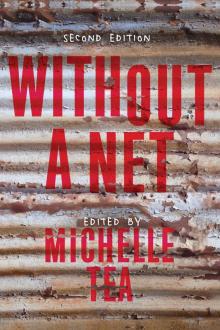 Without a Net
Without a Net Black Wave
Black Wave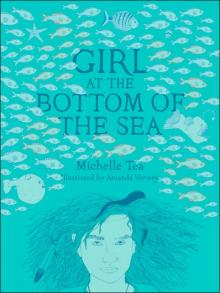 Girl at the Bottom of the Sea
Girl at the Bottom of the Sea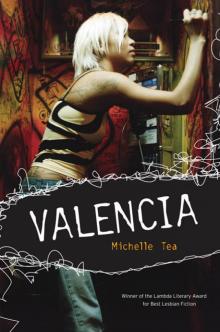 Valencia
Valencia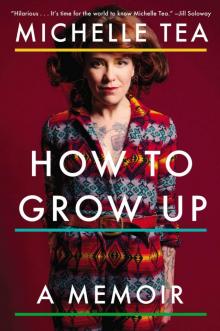 How to Grow Up
How to Grow Up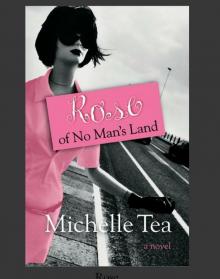 Rose of No Man's Land
Rose of No Man's Land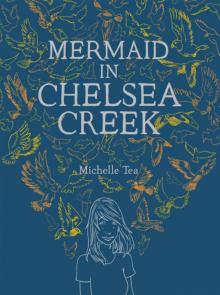 Mermaid in Chelsea Creek
Mermaid in Chelsea Creek